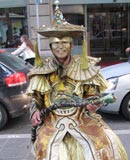不支持Flash
|
2009年浙江省普通高考英语考试说明(6)
C
Decisions, decisions! Our lives are full of them, from the small ones to the life-changing. The right to choose is central to everyone. Yet sometimes we make bad decisions that leave us unhappy or full of regret. Can science help?
Most of us know little about the mental processes that lie behind our decisions. Luckily, what psychologists (心理学家) are finding may help us all make better choices. Here are some of their amazing discoveries to help you make up your mind.
Consider your emotions. You might think that emotions are the enemy of decision making, but in fact they’re a part of it. Whenever you make up your mind, your brain’s emotional center is active. University of Southern California scientist, Antonio Damasio, has studied people with damage to only the emotional parts of their brains, and found that they were unable to make basic choices about what to wear or eat. Damasio thinks this may be because our brains store emotional memories of past choices, which we use to help the present decision making.
However, making choices under the influence of an emotion can greatly affect the result. Take anger, for example. A study by Nitika Garg of the University of Mississippi and other scientists found the angry shoppers were more likely to choose the first thing they were offered rather than considering other choices. It seems anger can lead us to make quick decisions without much thinking.
All emotions affect our thinking and motivation (动机), so it may be best to avoid making important decisions under their influence. Yet strangely there’s one emotion that seems to help us make good choices. The American researchers found that sad people took time to consider the various choices on offer, and ended up making the best choices. In fact many studies show that people who feel unhappy have the most reasonable view of the world.
48. According to the text, what may help us make better decisions?
A. To think about happy times.
B. To make many decisions at a time.
C. To stop feeling regretful about the past.
D. To learn about the process of decision-making.
49. Damasio’s study suggests that ______.
A. emotions are the enemy of decision making
B. our brain has nothing to do with decision making
C. people with physical damage find it hard to make up their minds
D. our emotional memories of past choices can affect present decisions
50. Why are angry shoppers more likely to choose the first thing they are offered?
A. They often forget their past choices.
B. They make decisions without much thinking.
C. They tend to save time when shopping.
D. They are too angry to bargain.
51. What do we learn from the text?
A. Emotions are a part of decision making.
B. Sad people always make worst choices.
C. No emotion seems to help us make good choices.
D. Only sad feelings affect our thinking and motivation.
更多高考信息请访问:新浪高考频道 高考论坛 高考博客圈 高考贴吧
特别说明:由于各方面情况的不断调整与变化,新浪网所提供的所有考试信息仅供参考,敬请考生以权威部门公布的正式信息为准。




